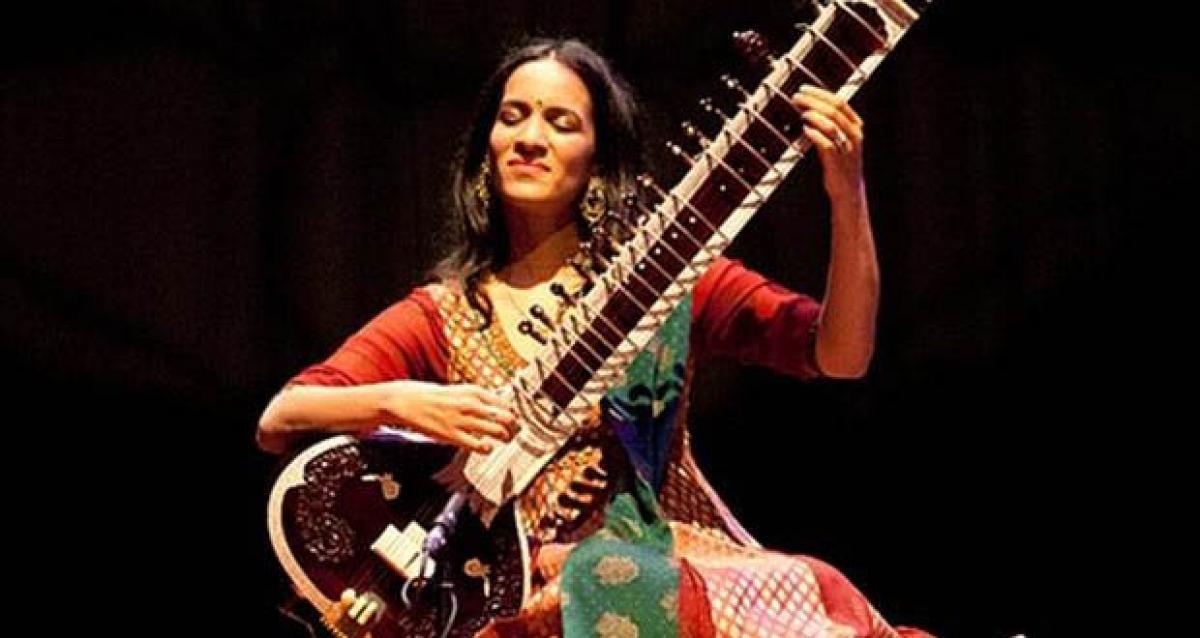Live
- Layering With Essentials Hoodie for Cozy and Chic Outfits
- Chanchalguda Jail Officials Say They Haven't Received Bail Papers Yet, Allu Arjun May Stay in Jail Tonight
- BJP leaders present evidence of illegal voters in Delhi, urge EC for swift action
- Exams will not be cancelled: BPSC chairman
- Nagesh Trophy: Karnataka, T.N win in Group A; Bihar, Rajasthan triumph in Group B
- YS Jagan condemns the arrest of Allu Arjun
- Economic and digital corridors to maritime connectivity, India and Italy building vision for future, says Italian Ambassador
- SMAT 2024: Patidar's heroics guide Madhya Pradesh to final after 13 years
- CCPA issues notices to 17 entities for violating direct selling rules
- Mamata expresses satisfaction over speedy conviction in minor girl rape-murder case
Just In

x
Highlights
Internationally acclaimed sitarist Anoushka Shankar says Indian classical music has a strong following abroad, but it\'s \"such a shame\" that the genre\'s popularity hasn\'t translated in the country of its origin.
Internationally acclaimed sitarist Anoushka Shankar says Indian classical music has a strong following abroad, but it's "such a shame" that the genre's popularity hasn't translated in the country of its origin.

The daughter of late sitar maestro Pandit Ravi Shankar earned her fifth Grammy nomination this week for her album "Home", which reaffirms Indian classical music's hold in the West.
"I think our music in its purest form is something what we always talk about here as being under threat. I see that less for myself because I don't come here that often, but I see my peers who say that they have to do collaborations and crossover fusion, and some kind of spin for it to sell," Anoushka, who is in the capital to perform a concert on Sunday evening, told IANS in a candid tete-a-tete.
"That's such a shame because there is a huge audience for our music abroad. I tour around the world, the classical shows would totally sell out. There is a huge audience for what we have to offer. It's a shame that it is not translating in the country of its origin," she added.
She says that the "narrow stream of media" here makes it seem that Indian classical music is under some "threat", but that's not entirely true.
"We have a narrow stream of media and it's really prominent and therefore it seems like Indian music is under threat, because it is not very visible. There is only one genre that's really visible. But if you go to any classical festivals in any of the cities, it is amazing, it is beautiful. There are thousands of people listening all night," she said.
While she doesn't like the comparison between India and the West, Anoushka, who resides in London, would like to take the positives from the western outlook towards music.
"I don't like the Indian and western comparisons, but the one thing I do like to take note of is that in the West, there is a space created for every genre so it's allowed to exist on its own.
"Opera has opera houses, classical music has symphony halls, electronic music has clubs, rock music has stadiums. Everyone has got their space and there is sponsorship, donorship, support, radio channels for each genre. There is a setup for each thing and people can go for what they want," she added.
She praised the Indian government for providing support to classical music and the arts, but lamented the lack of venues and media viability in the country.
"India does have a lot of governmental support for classical music and the arts, but it is not about that. Where are the concert halls? Where are the venues? Where are the radio stations? Where are the TV channels? That's where the problem lies a lot more than how many people listen to it," she said.
So, what, in her opinion, is the solution?
"If people within the classical music world could get some help in how to develop visibility in other media, whether it is streaming concerts live on subscription channels online for example... Anything that does it without diluting content is a priority," she said, while adding that private funding and donorship can also propel the music's growth.
"We rely on corporate sponsorship here. It has its place, but some private donors would be really helpful," she added.
For centuries, art and music have helped establish a spiritual connection between humans irrespective of their race or ethnicity. Anoushka says that music helps us to "reconnect to exalted, higher places" that are beyond all arguments.
"Music is where you can put words and belief systems aside and just connect heart-to-heart. You and I know, two people can connect from the heart... If you are not talking politics, you are not talking religion, you can still connect," she said.
"Music has always played a role because it helps reconnect back to more exalted, higher places beyond all other arguments and I think that's something that it is really important."

Next Story
More Stories
ADVERTISEMENT
© 2024 Hyderabad Media House Limited/The Hans India. All rights reserved. Powered by hocalwire.com







